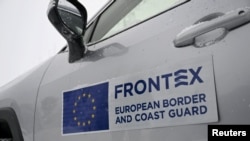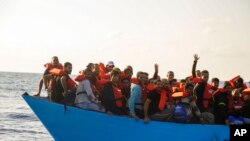Italy is a frontline country for migration to Europe and Giorgia Meloni's hard-right government has taken numerous measures to restrict the activities of charity ships that save people attempting the perilous crossing from North Africa.
In February, the Italian parliament approved a government decree that limits the ships to one rescue at a time, requiring them to sail immediately to assigned ports, which are often far away.
Dunja Mijatovic, the Council of Europe's Commissioner for Human Rights, urged Italy "to repeal policies and to end practices that hinder NGO search and rescue operations at sea."
Charities "continue to be targeted in political debate and are the object of smear campaigns," seizures and criminal investigations, "the overwhelming majority" of which are dismissed at the preliminary stage, she said in a report.
Italian authorities detained six charity rescue vessels in the first nine months of 2023 for breaking the decree rules, according to Doctors Without Borders (MSF), which runs one of the ships.
The vessels were immobilised for a total of 160 days -- over five months, it said in November.
The practice of assigning distant ports forced the MSF ship, the Geo Barents, to travel an extra 28,000 kilometers (17,400 miles), amounting to about 70 days of navigation.
"The criminalisation of (the charity ships') activities goes against Italy's obligations under international law" and "the practice of assigning distant places of safety is hampering the provision of life-saving assistance," Mijatovic said.
'Human rights violations'
Mijatovic also said the Italian authorities' cooperation with Libya and Tunisia on migrants gives "cause for concern ... from a human rights perspective.""
Rome works closely with the Libyan and Tunisian coastguards, providing funding and training to enable them to intercept and return to shore people attempting to leave, despite questions over those countries' human rights standards and treatment of migrants.
Mijatovic said she had "observed a direct causal link between Italy's cooperation activities with the Libyan coastguard and the exposure of people intercepted at sea to serious human rights violations."
She expressed concern over evidence that aerial surveillance assets provided by European Union border protection agency Frontex — and deployed under the coordination of Italy's interior ministry — may have led to boats being intercepted by the Libyan coastguard.
And she questioned Rome's apparent policy of prioritising interventions by the Libyan coastguard over those of nearby charity vessels, "delaying life-saving rescue operations" despite the Libyan coastguard "having repeatedly been proven to be ineffective" as well as violent.
In terms of Italy's collaboration with the Tunisian coastguard, Mijatovic pointed to "a significant body of evidence of serious human rights violations against refugees, asylum seekers and migrants in Tunisia."
In its response, Italy said cooperation with Libya and Tunisia was "pivotal to disrupt the local networks of migrant smugglers and traffickers, who would otherwise operate undisturbed, exploiting thousands of migrants in state of vulnerability and putting their lives at risk."
The Council of Europe, which comprises 46 member states, was set up to monitor and uphold human rights in Europe in the wake of World War II.



















Forum